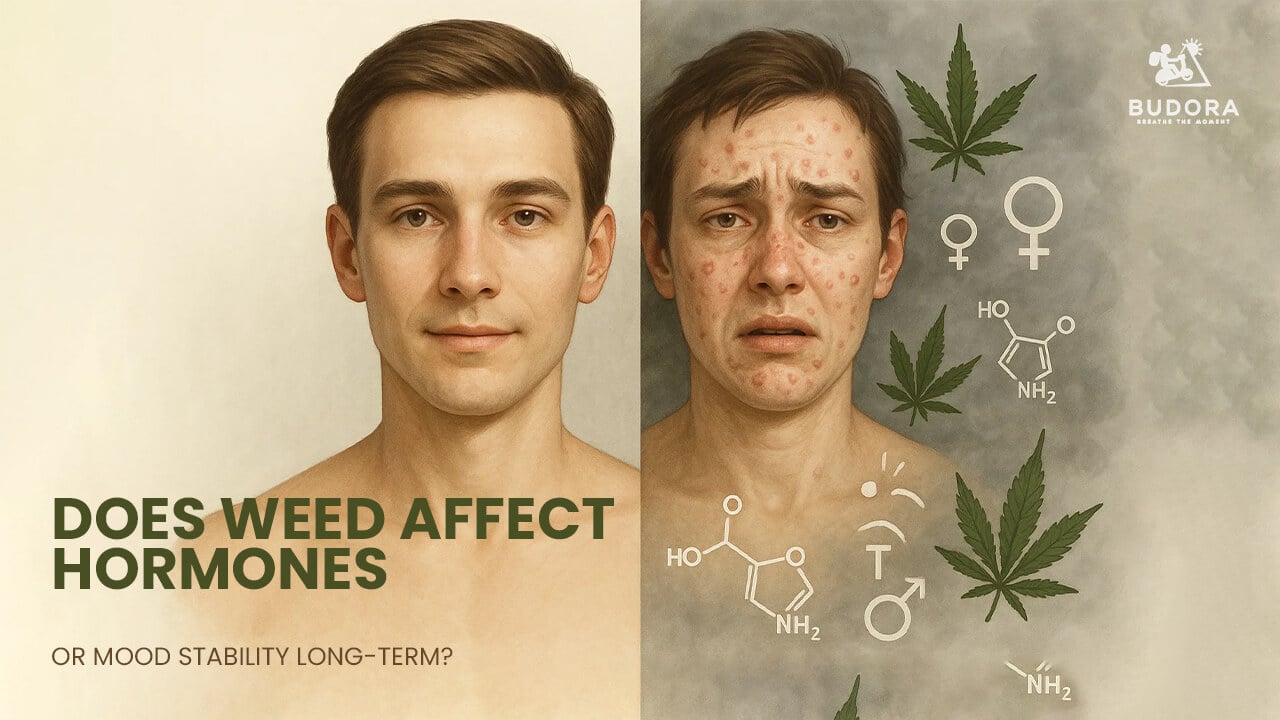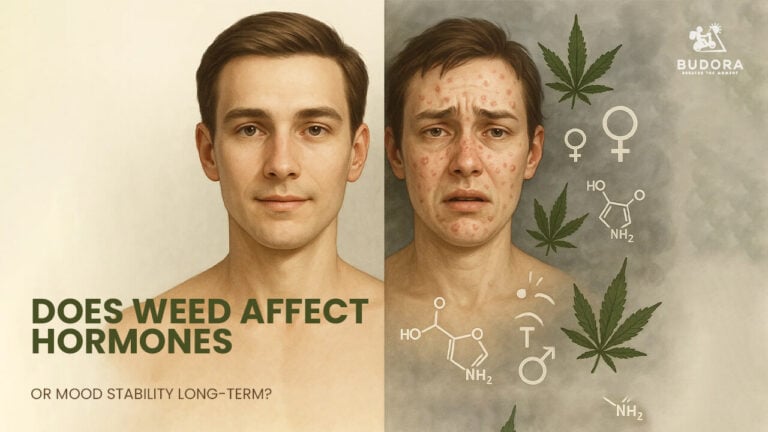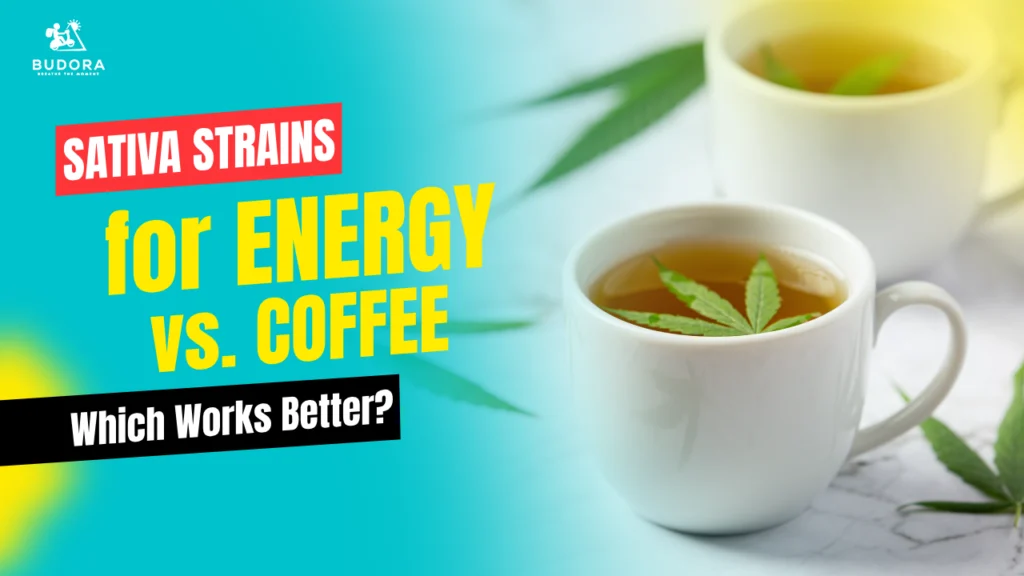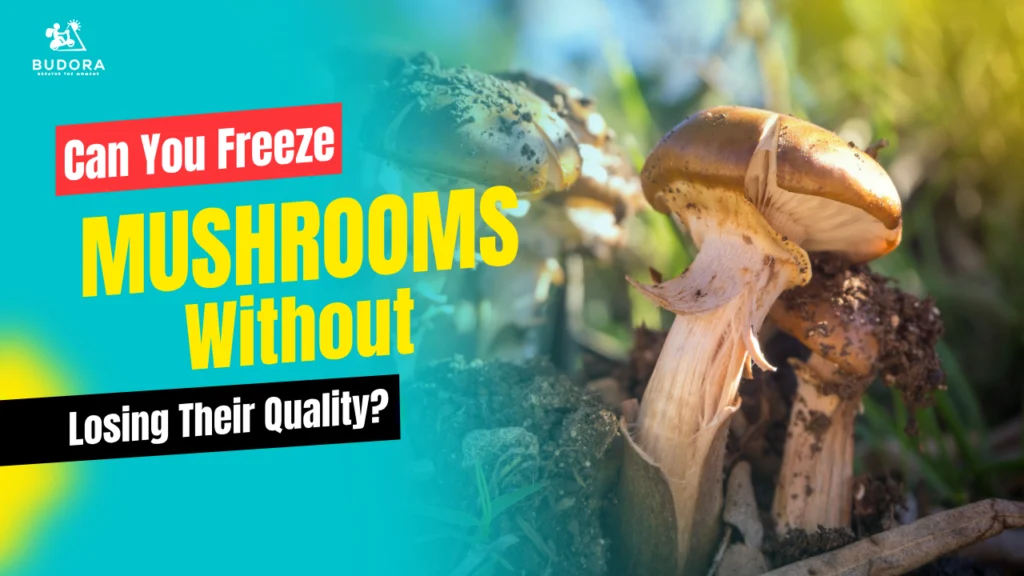Blog


Does Weed Affect Hormones or Mood Stability Long-Term?
- Budora Team
- No Comments
In recent years, cannabis use has surged globally, but so have questions around Does weed affects hormones. Beyond short-lived vibes and mellow moods, could heavy or long‑term use destabilize your endocrine system or emotional well-being? Let’s unpack the evidence and trace how long-term marijuana consumption may reshape your hormonal stability and mood.
Key Highlights
- Chronic cannabis use can disrupt hormones like testosterone and estrogen, leading to fertility issues in both men and women.
- THC affects mood stability long-term by altering cortisol, thyroid, and reproductive hormone levels.
- Hormonal imbalances caused by weed are often reversible after quitting, but recovery may take weeks to months.
1. Understanding the Endocrine Impact: Cannabis Hormone Imbalance
Cannabis contains active compounds like THC and CBD, which interact with the endocannabinoid system, a key player in maintaining hormonal balance. If you’re curious about how cannabis influences sleep-related hormones, check out the article on Mixing Cannabis and Melatonin for Sleep offers helpful insights.
But what about long-term hormonal effects? According to research from ZRT Lab, THC can disrupt the hypothalamic-pituitary-gonadal (HPG) axis, leading to the suppression of GnRH along with downstream hormones like LH and FSH, both critical for regulating testosterone and estrogen levels in men and women.
Key Hormone Effects:
- ↓ GnRH → ↓ LH, FSH → downstream decline in testosterone (♂) and estrogen/progesterone (♀).
- Chronic THC use can also suppress thyroid (↓ TSH, T3, T4) and adrenal function.
This is the essence of Cannabis hormone imbalance: prolonged cannabis use alters the entire hormonal cascade.
2. Does Weed Affect Hormones in Males?
Testosterone & Sperm
Studies show chronic THC reduces testosterone and sperm count/motility. For more on how cannabis use can affect reproductive health, check out the guide on Does weed cause Erectile Dysfunction?.
One infertile-male cohort even found that THC users had significantly lower estradiol and higher prolactin, shifting the T/E₂ ratio.
Parents.com notes sperm count and motility drop, though occasional users may not see pronounced effects.
Mood & Hormones
- Hormonal shifts (low testosterone, elevated prolactin) can cause fatigue, low libido, and anxiety.
- Evidence is mixed: some users report improved mood; others experience irritability, depressive swings.
Summary
Yes—Does weed affect hormones in males? —especially with frequent use. Fertility and mood alterations stem from disrupted sex hormones; however, moderate use may be less harmful.
3. Does Weed Affect Hormones in Females?
Studies in primates and women show that THC disrupts the HPO axis, lowering estrogen and progesterone, leading to irregular or failed ovulation cycles.
- OHSU’s primate study: thrice-weekly THC edibles over three months triggered longer menstrual cycles and elevated FSH, signaling ovulatory dysfunction.
- Lowered estrogen can provoke mood swings, decreased sex drive, and cycle irregularity.
- Changes in testosterone levels may also impact skin — see post on Does smoking weed cause acne?.
- Women are more sensitive to THC effects—when estrogen levels are high, CB1 receptors become more reactive, amplifying anxiety or euphoria.
- Mood stability can shift unpredictably with fluctuating estrogen interacting with occasional or chronic cannabis use.
Hence, does weed affect hormones in females? —unequivocally yes. The menstrual cycle, estrogen balance, and mood are vulnerable to disruption.
4. Other Hormones: Cortisol, Thyroid & Growth
- Stress Hormones: THC activates the HPA axis—short term, it might dampen stress, but chronic use can elevate baseline cortisol, leading to insomnia, weight gain, and anxiety.
- Thyroid Function: Chronic THC lowers TSH, T3, T4—resulting in fatigue, cold sensitivity, faint mood.
5. Mood Stability & Long‑Term Cannabis Use
- Hormonal dysregulation—low sex hormones, cortisol imbalances, thyroid suppression—can cumulatively destabilize mood.
- Some users enjoy short-term stress relief or euphoria, especially women (via THC‑estrogen interaction).
- However, over time, drops in testosterone or estrogen, elevated prolactin, and chronic cortisol dysregulation can yield mood swings, depression, or anxiety.
Thus, does weed affect hormones long-term? Evidence suggests it likely contributes to mood destabilization when overused.
6. CBD Hormone Interaction: A Gentler Contender?
CBD, unlike THC, doesn’t bind CB receptors directly but influences serotonin, dopamine, and possibly cortisol/metabolic hormones. If you’re new to cannabis or choosing between THC and CBD, the Beginner’s Guide to Weed is a must-read.
- Studies suggest CBD may modestly reduce cortisol and inflammatory markers, but it’s far less disruptive than THC regarding reproductive or thyroid hormones.
- CBD hormone interaction may support anxiety relief without major endocrine chaos.
In blog writing, differentiate THC-dominant vs. CBD-rich cannabis to address hormone concerns.
7. Cannabinoids & Fertility: Long‑Term Consequences
The link between cannabis and fertility issues is well-documented:
Males
Lower sperm count, motility, testosterone, and DNA integrity; fertility returns slowly after quitting.
Females
Delayed ovulation, cycle irregularity, implantation issues; study shows users are ~40% less likely to conceive.
This aligns with cannabis effects on fertility—heavy use correlates with fertility declines in both sexes. Budora’s nutritional guide, What to Eat Before and After Using Cannabis, also explores how diet can support reproductive health.
8. Can Hormones Rebalance After Quitting?
Good news: many hormonal effects are reversible after cessation.
- ZRT Lab reports that adrenal, thyroid, and reproductive hormones often recover after quitting THC.
- A fertility-focused study found sperm and cycle regularity improved post-abstinence.
Still, recovery timelines vary—weeks to months for hormonal normalization, longer for fertility.
Summary Table
| Hormone/System | Long‑Term THC Impact | Reversible? |
|---|---|---|
| Testosterone (♂) | ↓ testosterone, sperm count/motility | Yes with time |
| Estrogen/progesterone (♀) | Disrupted cycles, ovulation, THC–estrogen imbalance | Yes, cycle resume |
| Cortisol | Initially ↓, but with chronic use ↑ , baseline levels | Possibly |
| Thyroid (TSH/T3/T4) | Suppression → fatigue, mood shifts | Yes |
| Fertility (♂ & ♀) | Lower conception rates, implantation issues | Partly |
| Mood stability | Risk of mood instability long-term | Varies |
Final Thoughts: Does Weed Affect Hormones
Does Weed Affect Hormones or Mood Stability Long‑Term? Yes, especially with heavy, regular use. Cannabis can cause a Cannabis hormone imbalance, impacting sex hormones, stress, thyroid function, fertility, and emotional stability. While some effects fade after quitting, long-term users should monitor hormone levels and seek medical guidance.
If you’re using cannabis for relaxation or stress relief, consider:
- Limiting THC-rich products.
- Switching to high-CBD, low-THC formulas for gentler effects.
- Periodic hormone testing.
- Using non-cannabis stress tools (meditation, exercise, therapy).
By balancing usage and staying informed, you can enjoy cannabis mindfully, without jeopardizing your endocrine or emotional health.
FAQs
Does weed affect hormones?
Does weed affect hormones in males?
Does weed affect hormones in females?
What are the cannabis effects on fertility?
Can CBD hormone interaction be safer than THC?
Is mood stability affected long-term by cannabis?
Can your hormones rebalance after quitting cannabis?
Like this article?

Budora Team
OTHER ARTICLES YOU MAY LIKE













